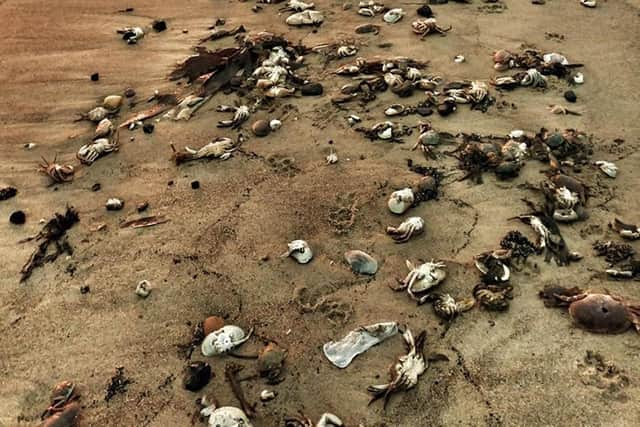Scientists who investigated crab and lobster die off ‘surprised’ politicians have ‘questioned their integrity’
The 13-person panel of experts conducted a review of all the evidence gathered during a Government-run investigation into the deaths of the crustaceans, which began washing ashore between Hartlepool and Whitby in October 2021.
The panel said it was “unable to identify a clear and convincing single cause” but the “most likely” explanation is an unknown disease or parasite killed the crustaceans, after it was convened by the Department for Environment, Food and Rural Affairs’s (Defra) Chief Scientific Advisor Professor Gideon Henderson.
Advertisement
Hide AdAdvertisement
Hide AdThe findings have been disputed in recent weeks by local fishermen and a number of Labour MPs, with Geraint Davies claiming it was “farcical” to suggest a “phantom pathogen” caused the deaths.


He also said members of the panel were “working for Defra and, indeed, for the ports”, when he spoke at an Environment, Food and Rural Affairs Committee hearing.
When asked about potential conflicts of interest, several members of the panel declared they had worked on unrelated Defra-funded research projects.
One expert said he worked on research projects on the River Tees that were “funded by the ports industry and by government” but that work “is of relevance to the matters under consideration by the panel relating to dredging and coastal processes”.
Advertisement
Hide AdAdvertisement
Hide AdDr Alex Ford, a marine biology expert who was on the panel, said he was “surprised at the poor behaviour of the politicians from both parties” who have been “trying to discredit and question the integrity of the scientists”.
But he also accepted that trust in government agencies such as Defra has been eroded and said “that is something they should be working hard to regain”.
Fishermen and scientists from several universities are convinced the crustacean deaths were linked to an industrial chemical called pyridine, that was released by dredging done as part of the Government-backed Teesside Freeport project, but the panel found that was “very unlikely”.
Dr Ford, a professor at the University of Portsmouth, said more work can be done to try and establish a clear cause of the deaths.
Advertisement
Hide AdAdvertisement
Hide Ad"I think it would be worthwhile to screen any archived samples for potential novel pathogens and be ready on standby for any future events,” he said.
“In the UK agencies, we are fortunate to have some of the best crustacean pathologists in the world so if we do have another event, I'm fairly confident they will be in a stronger position to rule in or out the novel pathogen hypothesis.
“Shifting distributions of marine species due to climate change and global shipping present real issues for introducing novel pathogens and invasive species. We impact our coasts through development, fishing and pollution from many sources.
“Only through good monitoring and well-funded agencies and scientists more generally will we be able to proactively intervene or retrospectively find answers."
Advertisement
Hide AdAdvertisement
Hide AdHe added: “One only has to look at diseases such as mad cow disease and foot and mouth disease in farming, seal viruses in the ocean through to Covid in humans, that these can appear quickly and have dramatic effects.
“We know novel pathogens have arrived in the crab populations along the south coast of England in the past few years, therefore we should always be mindful of new parasites arriving."
In their report, the panel said a disease or parasite that is new to UK waters is "the most likely cause", but no pathogens were identified because full molecular screening was not conducted during the initial investigation.
It said there are three factors which suggest a disease or parasite is the cause: only crustaceans died, they were found across a large area – around 70km of coastline – and some were twitching when they were discovered.